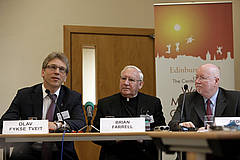Anniversary events mark “stations on our common journey”
“Mission is a commandment, and unity is a prayer,” according to Bishop Brian Farrell of the Roman Catholic Church. The commandment to make disciples is found in the “great commission” of Jesus in Matthew 28:16-20, and John 17:21 records Christ’s prayer that all his followers may be one.
On Saturday 5 June 2010, the fiftieth anniversary of the formation of the Roman Catholic Secretariat for Promoting Christian Unity, three leaders of prominent traditions of Christianity reflected on the hundred years since the World Missionary Conference at Edinburgh in June 1910 and the half-century since the Second Vatican Council of the 1960s. Bishop Brian Farrell of what is now the Pontifical Council for Promoting Christian Unity (PCPCU), Rev. Dr Geoff Tunnicliffe of the World Evangelical Alliance (WEA) and Rev. Dr Olav Fykse Tveit of the World Council of Churches (WCC) spoke on the topic “Christian unity today” in a morning press conference at Edinburgh 2010.
Bishop Farrell explained that the original secretariat was formed by Pope John XXIII to facilitate the participation of observers from other Christian bodies, representatives of the so-called “separated brethren”, in the life of Vatican II. He also emphasised the role of the PCPCU in helping bishops educated in a dated “theology of exclusion” to move to genuinely ecumenical commitment. The documents produced during the Second Vatican Council “recognised the already existing ecumenical movement as a gift of the Holy Spirit”, setting the stage for Catholic co-sponsorship of interdenominational gatherings like Edinburgh 2010.
Geoff Tunnicliffe, the WEA’s international director, observed that individuals tend to look at history “through their own prisms”. For example, he said, members of the evangelical movement look back to the Edinburgh conference of 1910 and see a meeting that was all about mission and led to new approaches towards world evangelisation. Others see Edinburgh 1910 as the birth of the modern ecumenical movement and trace its outcomes primarily through councils encouraging the visible unity of the churches. “This is a difference,” he said, “but it is understandable.” Several observances of this centennial have been organised with differing emphases, in Tokyo, Edinburgh, Capetown and elsewhere. But while tensions between Christian streams have led to reluctance in some circles to use the term “ecumenical”, it is now possible for diverse groups to come together as stakeholders in an event like Edinburgh 2010.
Olav Fykse Tveit, general secretary of the WCC, argued that the 1910 conference “brought a new dynamic into all of Christianity and raised the question of unity in evangelism”. He continued, “We are here to remind ourselves that we should not divide our calling, but we should share our calling.” He insisted that it would be a mistake to assign one group of churches the task of evangelism, and another the task of seeking social justice and peace. Rather than accepting such a division of labour, “we must respond to our common calling together. The world needs the gospel. The world also has the need for justice and peace.” For this reason, he said, the WCC tries to offer “a wide space, a meeting-place for a variety of traditions but also a space for the powerless, for those who have trouble making themselves heard in the world.”
Challenged by journalists regarding disparities in their traditions’ positions on the ministry of women and human sexuality, the speakers admitted complexities in many areas of dialogue and cooperation. “All that we can say,” Farrell told his audience, “is that we are totally committed to finding the way forward together.” One proof of this commitment is “the visible reality of our being here today,” he added. Tveit warned against “self-fulfilling prophecy” focused on church divisions rather than the churches’ shared concerns for common witness, the preservation of God’s creation, social justice and peace. He added, “We have all received the same gift, and we share the same calling.” Tunnicliffe recalled that a week ago many confessions were represented in Geneva as part of an ongoing, multilateral process to draft a Christian “code on conversion” detailing ethical standards for evangelism. “Active work is continuing to take place, even as we recognise the differences that exist among us,” he said.
“Don’t expect this conference to solve all the questions on the table,” Farrell advised. “But if we are on a journey, we need to stop from time to time, check our progress and our direction, refresh ourselves for the days ahead.”
Tunnicliffe observed that Christ’s prayer for unity in John 17 teaches Christians that “the recognition of Jesus by the world is directly connected to our oneness. But diversity can be a strength, if the world sees us together even in our diversity.”
Edinburgh 1910, Edinburgh 2010 and other events along the way “are stations on our common journey,” remarked Tveit. “If the outcome of this conference does not strike us as revolutionary, it will be because we have experienced so much already. We have a deepening recognition that we all are called to proclaim the gospel, and we are learning to do so together.”

